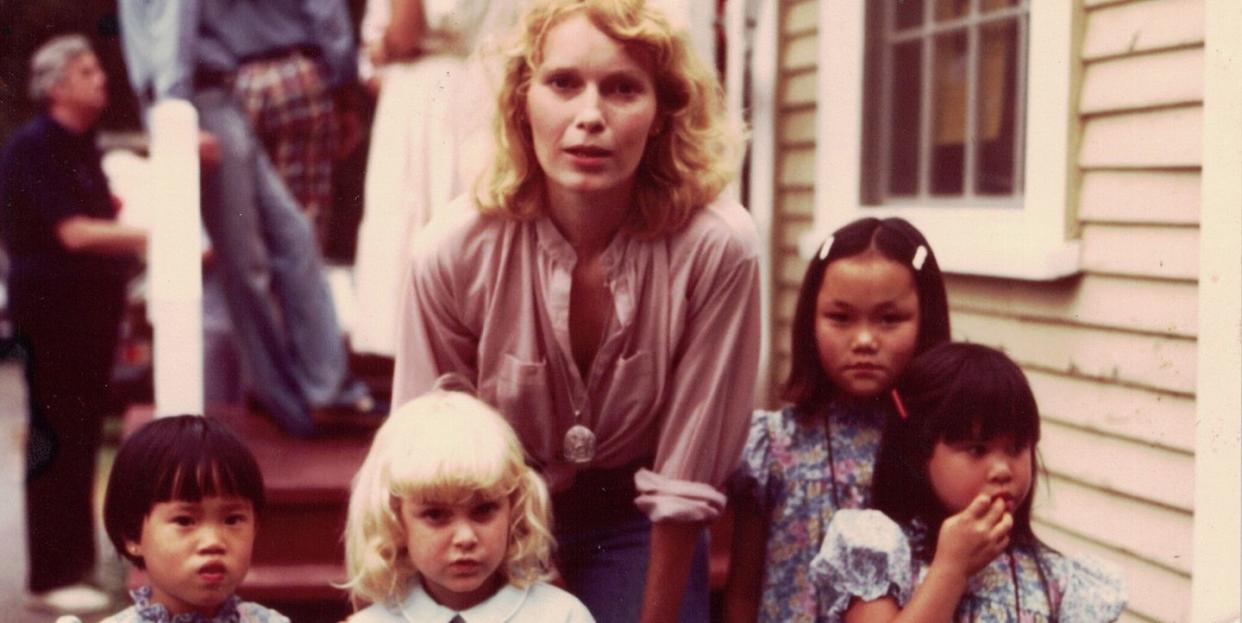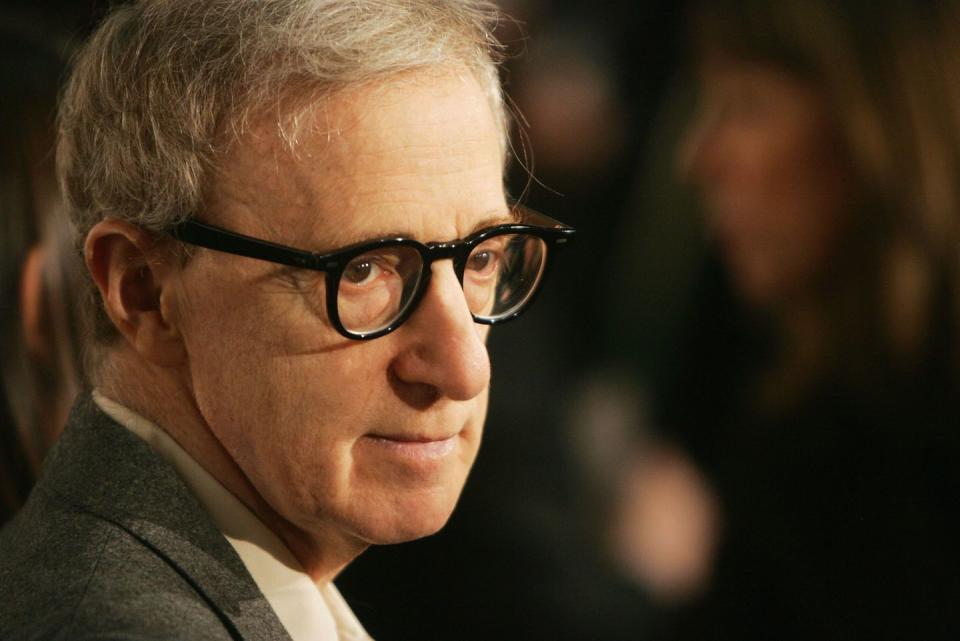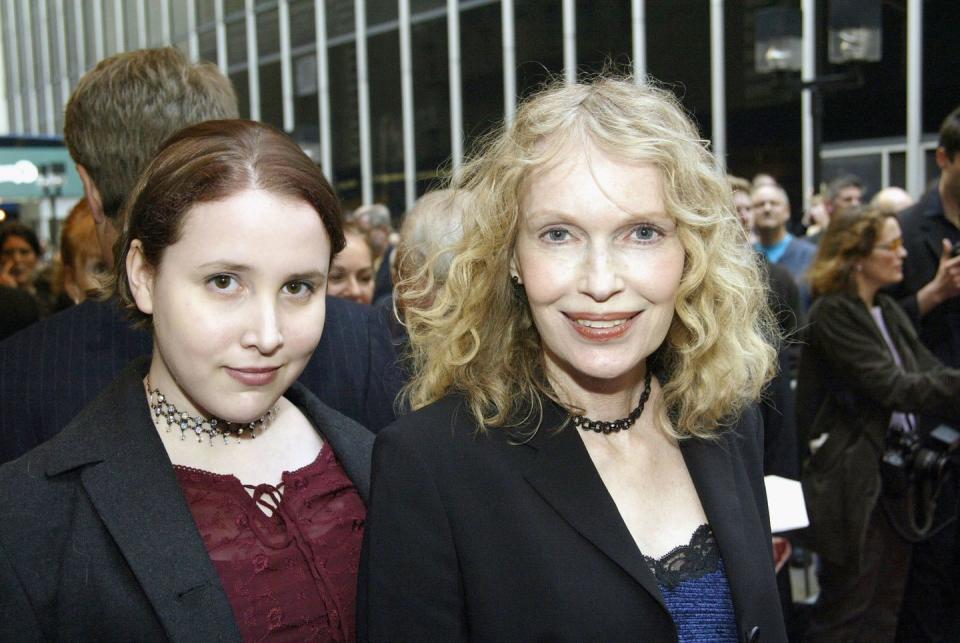The Key People to Know in 'Allen v. Farrow'

- Oops!Something went wrong.Please try again later.
- Oops!Something went wrong.Please try again later.
- Oops!Something went wrong.Please try again later.
- Oops!Something went wrong.Please try again later.
HBO’s new documentary series Allen v. Farrow delves into the deeply troubling family dynamics between director Woody Allen, his former partner Mia Farrow, her adopted daughter Soon-Yi Previn, and his adopted daughter Dylan Farrow, who has accused him of sexual abuse. The series, which premiered last weekend, blends home movie footage and court documents with new interviews from Mia and Dylan, among many others. There are several key figures to keep track of in this disturbing saga, so below is a guide to Allen, Farrow, and their kids.
Watch Allen v. Farrow on HBO MAX
Mia Farrow

Mia Farrow is an actress who has starred in some of the most iconic movies of all time, including Rosemary’s Baby (1968) and The Great Gatsby (1974). She began dating Woody Allen in 1980 and acted in several of his movies, including Hannah and Her Sisters (1986) and The Purple Rose of Cairo (1985).
Mia and Allen never married, but they were together for 12 years. During that time, the couple adopted two children, Dylan and Moses Farrow, and had one biological child, Ronan Farrow. Mia and Allen split in 1992, shortly before Allen publicly revealed that he was dating Soon-Yi Previn, Mia’s 21-year-old daughter. Mia reportedly learned of this relationship early in 1992, when she discovered nude photographs of Soon-Yi in Allen’s apartment.
Woody Allen

Woody Allen is one of Hollywood’s most renowned writer-directors, best known for bittersweet comedies depicting life in New York City—most famously Annie Hall (1977) and Manhattan (1979). The latter film has come under renewed scrutiny in recent years, because it stars Allen as a 40-something man who begins a relationship with a 17-year-old high schooler, played by teenage actress Mariel Hemingway.
Toward the end of 1991, Allen (then 56) began a romantic relationship with 21-year-old Soon-Yi Previn. Soon after, in August of 1992, Allen allegedly sexually assaulted Dylan Farrow, his then seven-year-old adopted daughter. Years later, in 2014, Dylan herself wrote publicly about the alleged abuse for the first time in a New York Times essay. Allen has consistently denied the allegations, most recently calling HBO’s Allen v. Farrow “a hatchet job riddled with falsehoods.”
Dylan Farrow

Dylan was adopted by Mia on July 11, 1985, at just two weeks old. In 1992, when Dylan was seven, she told her mother that Allen had sexually molested her. Mia reported this to Dylan’s pediatrician, who alerted the authorities. A lengthy and brutal custody battle ensued throughout 1992 and 1993, during which the abuse allegations were covered extensively in the press.
Mia was ultimately given full custody of Moses, Dylan, and Ronan. In the custody ruling, the judge wrote of Allen's relationship with Dylan, "The evidence suggests that it is unlikely that he could be successfully prosecuted for sexual abuse. I am less certain, however, than is the Yale-New Haven team, that the evidence proves conclusively that there was no sexual abuse."
The judge also stated that we may never know exactly what happened between Allen and Dylan that day in 1992, but called Allen’s behavior “grossly inappropriate” and stressed that “measures must be taken to protect [Dylan].”
Soon after the custody decision, Connecticut state attorney Frank Maco said publicly that although he had “probable cause” to prosecute Allen, he wouldn't do so because he wanted to spare Dylan “the trauma of a court appearance.”
Since the age of eight, Dylan has been using a different name in her everyday life—according to a recent ELLE profile, this is “in order to psychologically distance herself from the events of those tumultuous years.” She still uses Dylan “as a sort of pen name, starting with the 2014 essay, to avoid confusion given that Dylan is the name in all the court documents.”
Today, Dylan works as a writer and recently published her first novel, a YA fantasy titled Hush. She’s been married to her college boyfriend for 10 years, and the couple live in Connecticut.
In Dylan’s 2014 essay in the New York Times, she wrote about the alleged abuse. “These things happened so often, so routinely, so skillfully hidden from a mother that would have protected me had she known, that I thought it was normal,” she shared. “I thought this was how fathers doted on their daughters. But what he did to me in the attic felt different. I couldn’t keep the secret anymore.”
Moses Farrow

In 1980, Mia adopted a two-year-old son, Moses, from South Korea. Along with Dylan and Ronan, he was one of the three children whose custody was at the center of the court battle during 1992 and 1993.
In May of 2018, Moses wrote a blog post titled “A Son Speaks Out,” in which he defended his adoptive father, Allen, from Dylan and Mia’s allegations. He went on to allege that Mia was physically and emotionally abusive to him and “brainwashed” her children and claimed that Dylan’s allegations were a product of her mother’s coercion.
Dylan responded by calling Moses “a trouble person,” while Ronan reiterated his support for both his sister and mother: “My mother did an extraordinary job raising us, and none of my siblings with whom I’ve spoken ever witnessed anything but love and care from a single mom who went through hell to keep her kids safe.”
Soon-Yi Previn

In 1978, Mia and her then-husband, André Previn, adopted an eight-year-old living in a South Korean orphanage, Soon-Yi, and brought her home to the United States. Although Mia began seeing Allen just two years later, Soon-Yi has said that “he was never any kind of father figure to [her]. I never had any dealings with him [as a child].”
In 1991, Soon-Yi became romantically involved with Allen, and Mia soon discovered the relationship when she found nude photographs of Soon-Yi in Allen’s apartment. In August of 1992, Allen publicly confirmed his relationship with Soon-Yi in a statement. “Regarding my love for Soon-Yi: It’s real and happily all true. She's a lovely, intelligent, sensitive woman who has and continues to turn around my life in a wonderfully positive way.”
Soon-Yi has always defended Allen and denied the allegations against him, while alleging herself that Mia was abusive. “What’s happened to Woody is so upsetting, so unjust,” she told New York Magazine in 2018. “[Mia] has taken advantage of the #MeToo movement and paraded Dylan as a victim. And a whole new generation is hearing about it when they shouldn’t.” In a recent joint statement, Allen and Soon-Yi denounced HBO’s Allen v. Farrow as a “hatchet job riddled with falsehoods.”
Ronan Farrow

On December 19, 1987, Mia gave birth to her first and only biological child with Allen, a son named Satchel Ronan O’Sullivan Farrow. As an adult, Satchel goes by his middle name Ronan. He rose to prominence as a journalist in 2017, when he reported extensively on Harvey Weinstein’s sexual misconduct for The New Yorker, and ultimately won a Pulitzer for the coverage.
Ronan has consistently supported his adopted sister Dylan in speaking out against Allen. “I love and support my sister and I think her words speak for themselves,” he wrote on Twitter shortly after her NYT essay in 2014. A couple years later, he expanded on his support for Dylan in a Hollywood Reporter column, writing, "I believe my sister. This was always true as a brother who trusted her, and, even at 5 years old, was troubled by our father's strange behavior around her."
Ronan went on to emphasize that he also found Dylan’s allegations credible “as an attorney and a reporter ... the facts are persuasive and well documented.”
You Might Also Like

